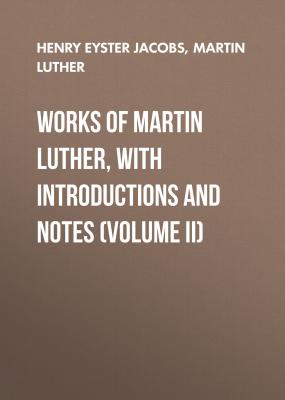Works of Martin Luther, with Introductions and Notes (Volume II). Martin Luther
Чтение книги онлайн.
Читать онлайн книгу Works of Martin Luther, with Introductions and Notes (Volume II) - Martin Luther страница 29
 to spiritual matters. Gess,
to spiritual matters. Gess, 77
Luther puts a peculiar construction upon this passage.
78
The ancient service was divided into the service of the Word (
79
The "great ban" excluded from all services.
80
According to Roman Catholic usage there is a distinction between hearing mass and receiving the sacrament.
81
Compare Treatise Concerning the Blessed Sacrament, above, p. 25.
82
In this edition, I, 337 ff.
83
Enders, II, 414; Smith,
84
Enders, II, 424.
85
See below, p. 62.
86
See letter of June 7th to John Hess, Enders, II, 411; Smith, I, No. 265.
87
Published at Rome 1519; printed with Luther's preface and notes, Weimar Ed., VI, 328ff.; Erl. Ed., op. var. arg., II, 79 ff.
88
89
See Enders, II, 415, 443; Smith, Nos. 269, 279, and documents in
90
See Köstlin-Kawerau,
91
See Luther's letters to Lang and Staupitz, who wished to have the publication withheld (Enders, II, 461, 463).
92
93
Below, pp. 65-99.
94
See
95
See title
96
Printed as an appendix in
97
So it was called by Johann Lang (Enders, II, 461).
98
99
An ironical comparison of the monks' cowl and tonsure with the headgear of the jester.
100
i. e., Which one turns out to be the real fool.
101
The proverb ran,
102
Evidently a reference to the
103
Councils of the Church, especially those of Constance (1414-18), and of Basel (1431-39).
104
Charles V. was elected Emperor in 1519, when but twenty years of age. Hutten expresses his "hopes of good" from Charles in
105
Frederick Barbarossa (1152-1100).
106
Frederick II (1212-1250), grandson of Barbarossa and last of the great Hohenstaufen Emperors. He died under excommunication.
107
Pope Julius II (1503-1513). Notorious among the popes for his unscrupulous pursuit of political power, he was continually involved in war with one and another of the European powers over the possession of territories in Italy.
108
Luther's recollection of the figures was faulty.
109
The term "Romanist" is applied by Luther to the champions of the extreme form of papal supremacy. C. Vol. I, p. 343 f.
110
i. e., The three rods for the punishment of an evil pope.
111
112
113
Lay-baptism in view of imminent death is a practice as old as the Christian Church. The right of the laity to administer baptism in such cases was expressly recognized by the Council of Elvira, in the year 306, and the decree of that Council became a part of the law of the Church. The right of the laity to give absolution in such cases rests on the principle that in the absence of the appointed official of the Church any Christian can do for any other Christian the things that are absolutely necessary or salvation, for "necessity knows no law." Cf. Vol. I, p. 30, note 2.
114
The canon law, called by Luther throughout this treatise and elsewhere, the "spiritual law," is a general name for the decrees of councils ("canons" in the strict sense) and decisions of the popes ("decretals," "constitutions," etc.), promulgated by authority of the popes, and collected in the so-called
115
Augustine, the master-theologian of the Ancient Church, bishop of Hippo in Africa from 395-430.
116
Ambrose, bishop of Milan from 374-397, had not yet been baptised at the time of his election to the episcopate, which was forced upon him by the unanimous voice of the people of the city.
117
Cyprian, bishop of Carthage, 247-258, is said to have consented to accept the office only when the congregation surrounded his house and besought him to yield to their entreaties.
118
119
The
120
i. e., They are all Christians, among whom there can be no essential difference.
121
The sharp distinction which the Roman Church drew between clergy and laity found practical application in the contention that the clergy should be exempt from the jurisdiction of the civil courts, This is the so-called